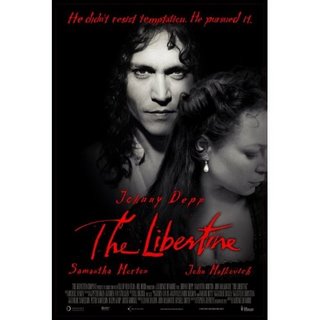
Okay, now that the election is past (mostly, as of this paragraph a couple of Senate seats are still in the air), I feel more at liberty to think about things like movies and comics and not who will control the actions of the nation. THE LIBERTINE isn't exactly apolitical fantasy, but it's an escape of sorts, to a world of no "family values" and precious little concern for moral purity of any kind. Not a pleasant world, but a refreshing change. A costume drama that avoids any hint of stuffiness, THE LIBERTINE is a nicely dry tonic, and a minor triumph for star Johnny Depp, who has had many.
Depp plays John Wilmot, the Earl of Rochester, courtier to King Charles II (John Malkovich.) Prone to boozing, wenching and writing smutty lampoons, Rochester (as he's usually called) has, at the start, come back from a brief exile to the country imposed after one of his works of verse pushed a few too many buttons. Not that anyone cares too much- after the deposition and execution of the Puritan dictator Oliver Cromwell, Britain has entered an age of art, culture, and decadence. Upper class gentlemen openly cheat with whatever whores are available, in theater boxes and in the streets. The theaters have been reopened, and female actors are now common. Rochester finds himself drawn, and not just carnally, to struggling actress Elizabeth Barry (Samantha Morton), who is on the verge of being fired when he makes a bet with his friends that he can make her a star. Meanwhile, the King commissions Rochester to write a play to be performed at a royal function for the French ambassadors, while Britain seeks a loan from the often-rival nation. The resulting work, a pornographic satire of the court, doesn't go well, and Rochester flees to avoid punishment, beginning a slow decline.
Describing the plot is difficult because of the film's structure; it's mostly episodic, albeit with events from one episode bleeding into another and so on. Adapted from Stephen Jefferys from his play (originally staged with Malkovich as the star), the script has nothing stagy about it; we leap from location to location and scene to scene in such an obviously cinematic way that I was surprised to learn that it was an adaptation to start with. Shot in desaturated color (something I normally dislike), the film portrays a particularly grimy, grey late Restoration, a foggy haze (or hazy fog) drifting through the streets. Not only does it feel authentic, it reflects the sort of fatigued hedonism that dogs the protagonist. Director Laurence Dunmore used a handheld camera almost entirely throughout, and relied on lighting from candles in most scenes, again adding both realism and a since of intimacy that's necessary for us to connect with the growing unpleasantness on screen. And, I have nowhere else to put this, so I'll just say that this film may have the tiniest credits in the history of film. Seriously, I had to use the zoom function just to read the prologue.
Johnny Depp's performance does little to challenge the conventional wisdom that he's a consistently great actor. Rochester doesn't change much, to his ruin, but Depp captures a certain nuance in his strident antiheroism. The character begins things by addressing the audience, insisting up front, "you will not like me." However, it seems a desire for attention drives him constantly, which makes it all the more lethal for him when he is forced to hide. Depp manages to make Rochester a compelling and very charismatic figure, even as he lounges in a drunken, syphilitic stupor, putting great burdens on his wife (Rosamund Pike) and the housemistress (Clare Higgins of the HELLRAISER saga). Also amusing is COUPLING's Richard Coyle as Rochester's slovenly manservant Alcock (Jack Davenport also appears as Harris, the theater director.)
It may have been possible for the film to better develop any one of the portions of Rochester's life we see fly by; his relationship with Barry and the genesis of his briefly-performed magnum opus play out too briefly for my tastes. But the film is engaging and perversely fun throughout, and manages a bit of psychological complexity on top of it. Above all else it's worth seeing for Depp's performance and for its vivid portrait of a seldom-explored age. At the end, I was forced to admit that maybe I did like Rochester, just a little.
GRADE: B+
No comments:
Post a Comment